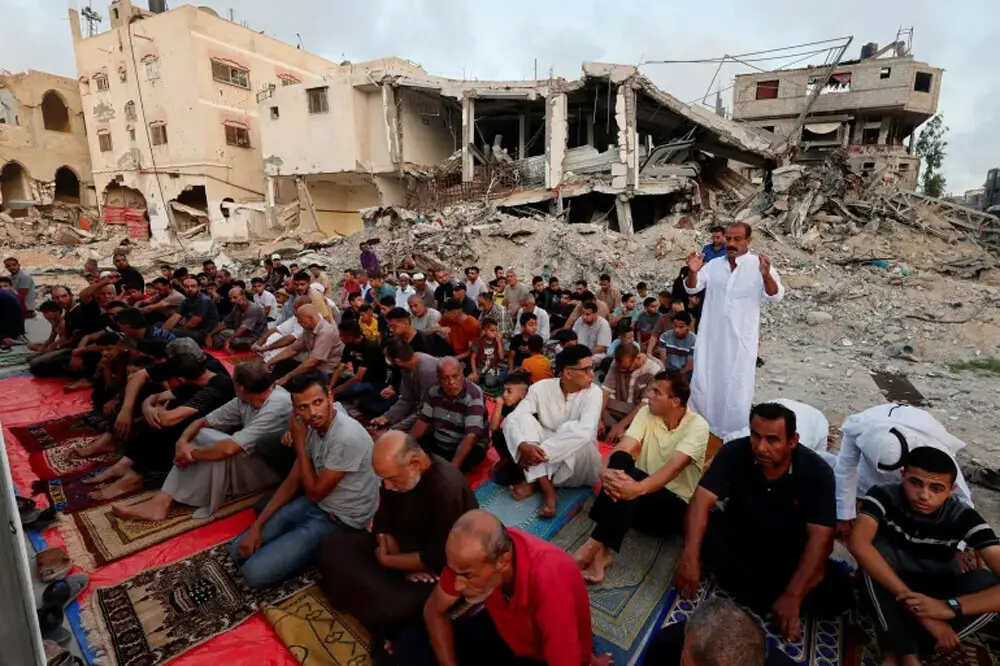Monday, March 31, 2025, marked the start of Eid al-Fitr in Gaza, the holiday that ends Ramadan’s month of fasting. Normally, it’s a day of big prayers, family feasts, and kids in new clothes, but this year—Gaza’s second Eid during the Israel-Hamas war—there’s little joy. With bombs still falling, food running out, and homes in ruins, Palestinians here are holding onto faith and each other, even if celebrations feel far away.

The moon decided it—Saudi Arabia spotted the Shawwal crescent Saturday night, setting Eid for Sunday, but Gaza, like Iran and Oman, went with Monday after no sighting. Before dawn, people gathered outside broken mosques—like the Omari Mosque in Gaza City, half-gone from airstrikes—to pray. “We’re here to show we won’t give up,” said Mustafa Alhelou in Rafah, speaking to CNN last year but echoing today’s mood. Men, women, and kids stood on rubble, saying “Allahu Akbar” (God is great), their voices mixing with the hum of drones overhead.
This Eid’s tough. Israel restarted heavy strikes on March 18 after Hamas wouldn’t free more hostages, ending a shaky ceasefire from January. Since then, hundreds have died—over 50,000 total since October 2023, says Gaza’s Health Ministry via Middle East Eye. No food or aid’s come in for four weeks, and 2.2 million people are hungry—half near starvation, a U.N. report warned last month. “It’s the Eid of Sadness,” Adel al-Shaer said in Deir al-Balah Sunday, crying after prayers. He lost 20 family members, including four nephews, in strikes last week.

Usually, Eid means sweets like ka’ik cookies and big meals—lamb stew, maybe salted fish. Not now. “I used to sell dozens of kilos of sweets for Eid,” a shopkeeper told Xinhua News Saturday. “Now, people can’t find bread.” Markets are empty, prices are sky-high, and Israel’s blockade keeps basics out. Still, some try—a soup kitchen in northern Gaza handed out whatever they could scrape together Sunday, says a 2024 CNN story that fits today too. “We share what’s left,” a mom in Rafah said, cooking a thin soup for her kids with no new clothes this year.

Kids feel it most. Before, they’d get toys and cash—Eidi—from uncles and aunts. Now, many are orphans or displaced, living in tents. “My son keeps asking, ‘Who’ll celebrate with me like Baba did?’” Um Ahmad told CNN last Eid, standing by her husband’s fresh grave. That pain’s back today—over 70% of homes are wrecked or damaged since 2023. Families prayed near new graves instead of feasting, honoring the dead, a tradition that’s stronger than ever.

Hamas floated a truce idea Friday—free some hostages, including U.S.-Israeli soldier Edan Alexander, for an Eid ceasefire. Qatar and the U.S. pushed it, but nothing’s set—Hamas wants the war done, Israel wants Hamas gone first. Strikes hit anyway—20 killed Saturday. “No sweets, just pain,” a Gaza man posted on social media last year, and it’s the same now.
In Rafah, where 1.5 million crowd, prayers went up Monday amid fears Israel’s next attack is coming. “We hold on to faith,” a father told Al Jazeera, baking cookies on a fire. It’s not the Eid they know—no lights, no laughter—but Gaza’s people mark it anyway, tough and quiet under a war that won’t stop.

